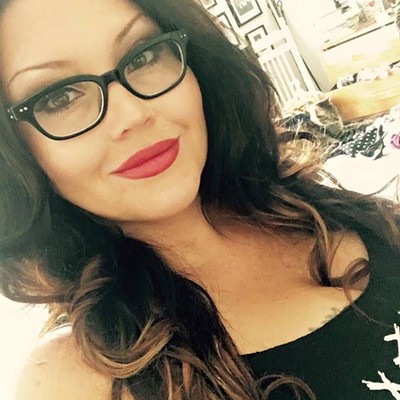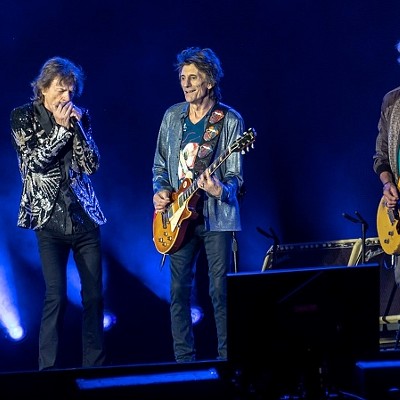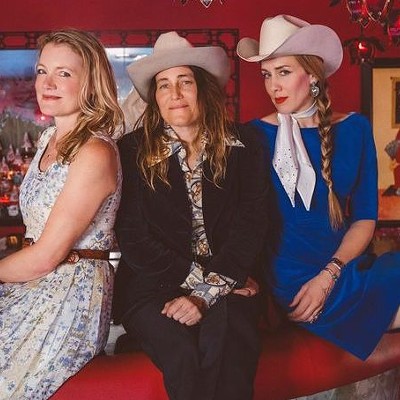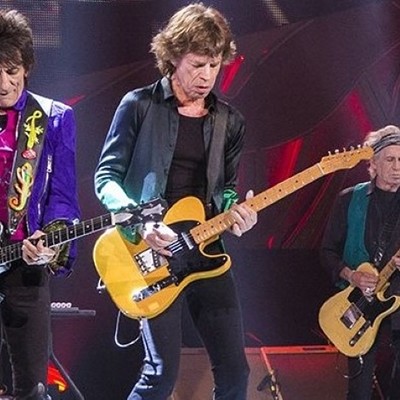One recent cold and rainy night, I ducked my drenched head into a low-lit coffee bar near Westheimer and Dunlavy. At the end of a long wooden table sat Alan “Doof” McCann, who has been sound engineer, PA tech and jack-of-all-trades to some of music's biggest names: Lostprophets, Fightstar, Funeral For a Friend, Bullet For My Valentine, Red Hot Chili Peppers, Pantera, the White Stripes and, most recently, Ghost, among dozens of others.
And now he's Houston's newest sound engineer at House of Blues and the Nightingale Room.
Even after he's lived here for more than four years, McCann’s name is most likely unknown to many Houstonians, but it shouldn’t be. A skilled professional (which he would rather deny than admit), McCann is no upstart. Ghost recently won four of the prestigious Danish music magazine Gaffa's annual awards, including Best Live Act of 2015, something that can be directly attributed to McCann.
He was born in Ireland and later emigrated to England, and McCann’s sensibility is wholly British — direct, without unnecessary small talk. He looks you dead in the eye and speaks from the gut.
“I love mixing; I love what I do," he says. "It’s got to be so quick, and I really like that there’s so many situations where you’ve just got to fix it. It’s not a studio where you can just re-record. I enjoy that. So many problems get thrown at you. I love that.”
He describes his humble beginnings in the music industry as being a 12-year-old boy who would rather hang out at a recording studio in his hometown of Wolverhampton than attend school. Serving tea to the musicians who were working there, McCann became an unofficial apprentice who grew up to be an incredible sound engineer.
“I didn’t like going to school much, and the guys in the studio were way more interesting," McCann laughs. "I moved on from that into film. I had wanted to be a film director, so I did some music videos and things like that. Then, got myself a guitar and took a guitar class and gravitated toward a mixing desk. I thought, ‘This is way more interesting than playing guitar.’”
Clutching my coffee, I remained absolutely silent while McCann unraveled stories not even most insiders know. The interview was a collection of fascinating facts and details, an oral history on what it means to live the rock and roll lifestyle in the modern day. Not only have McCann's ears tuned some of the finest rock shows in recent memory, but his eyes have witnessed the music business's highs and lows for more than 20 years.
Some of those lows have even hit him personally, like being let go from Ghost without warning.
But neither is he swayed by emotions. McCann's tale of his sudden departure from Ghost is not a sad digression or cautionary tale. The music business courts no loyalty toward anyone who is outside of the spotlight; crew, engineers and other support staff are all disposable. McCann knows the music business is a fickle lover, but he loves it anyway.
“So, Ghost — great band, great musicians...I always say they’re like the satanic ABBA,” he laughs.
Yet this is a man whose entire life has been surrounding music and supporting great acts, who many would say was unfairly let go from his last job. But if McCann harbors any ill will toward his former employer, he doesn’t show it. He shrugs it off as typical music-business nepotism and would rather recall the good times.
“I worked for Lostprophets for 12 years, which ended abruptly when the lead singer went to jail," he recalls. "Which was a shock for everyone, and I had a call from the Lostprophets’ old tour manager saying they had a new band that he was working with and thought I’d fit in really well. That was Ghost in 2013.”
Whatever the reason for McCann's departure, no one can find fault in his work, nor can they find fault in him. A quiet but serious soul when not mixing sound, he also creates yoga products and epic comic-book narratives. Hardly the stuff of a hostile work environment, but McCann is not a man to succumb to such easy shots.
His openness is a refreshing contrast to the pervasive placating that accompanies many music-industry interviews. Too many acts are willing to appease the media while hoping for positive press, and refuse to reveal their true feelings. Not McCann. While not resorting to gossip, McCann will tell the truth, no matter how uncomfortable it may be. Yet he's loyal to the bands he mixes.
“I’m [a] very loyal crew guy when it comes to our band," he affirms. "Even with Lostprophets, I was offered jobs with Metallica and Slipknot and I turned them down to stay loyal to the band. I wouldn’t jump ship just to get a bigger paycheck.”
Mixing at the "desk," McCann's term for what Americans call a soundboard, does not always happen in a perfect setting. The job has several hazards.
“I’ve had desks on fire, desks fall over or covered in beer…the more rowdy the band, the more I have to clean out the desk," he says. "Some tours I’d have to take it apart twice a week to clean it out. There are so many different desks. From the old days where we used analog desks to digital ones of today, they’re all a little different. And you’ve got to know them all inside out, or learn a new one as quickly while people are screaming ‘TIME! TIME!’ at you.”
A consummate professional, McCann handles himself well even when things seem to fall apart.
“You have to be calm and professional," he says. "If you start shouting at people, [it] gets them flustered and the repair time takes four times as long.”
It’s not just the crew who can be difficult. Fans can be as well.
“Usually the people standing at front of house near the desk either want to be engineers or they know [what] sounds best; they’ll all look around at you," McCann says. "It can be a pain in the ass as well. These people come up to you and say, ‘Oh, I want to hear more hi-hat,’ and you just look at them and say, ‘Fuck off’.'"
He laughs.
"You get idiots that go to a gig, and they’re having fun, getting drunk on a night out, and they’ll pass you a drink over the desk," McCann continues. "It’s a piece of electricity, you know? They’re like, ‘Oh, come on, have fun.’ People don’t realize you’re working.
"A lot of the bands I’ve worked with don’t want to do a line check. It gives away the whole big thing before they come onstage, so I’ve got to do all this through headphones in like ten or 15 minutes. So, as soon as a band comes onstage, it’s just fingers crossed you’ve got it right.”
McCann says he finds the live-music experience incredibly exciting, but not without hilarity and snares.
“Festivals are the worst thing to get thrown into," he explains. "You don’t even get a sound check. Festivals are really hard. I think with Lostprophets, when they headlined the Download Festival, there were 60,000 people there. No sound check. We just show up and do it. Festivals in Europe are cold, wet and dreary. They’re just shit to be around. You hang around all day doing absolutely nothing, and then maybe you have an hour and a half where everything goes mental and you’ve got to get it right straightaway.”
When reflecting on one particularly hilarious experience, McCann describes what would be most engineers' worst nightmare, but McCann handled it with a cheeky finesse. Appropriately enough, the festival in question was called HellFest.
"It was dark and there was only one digital desk," he says. "And, as I put my file in, my desk froze in like two seconds. It’s still passing audio but I can’t move or do anything. Which is bad, obviously...Halfway through the show, it stops working and freezes again.
"There was actually a bottle of wine and four glasses, so I poured them all glasses of wine and said, 'Switch them off!,' McCann continues. "To switch them off means the band will have to go offstage and the PA go completely silent while the desk reboots, which takes about three minutes. Forty thousand or 50,000 people all turn around and look at me, [and] I’m just standing there with a glass of wine.
"‘Sorry...Just wait.’”
Support Us
Houston's independent source of
local news and culture
account
- Welcome,
Insider - Login
- My Account
- My Newsletters
- Contribute
- Contact Us
- Sign out
[
{
"name": "Related Stories / Support Us Combo",
"component": "11591218",
"insertPoint": "4",
"requiredCountToDisplay": "4"
},{
"name": "Air - Billboard - Inline Content",
"component": "11591214",
"insertPoint": "2/3",
"requiredCountToDisplay": "7"
},{
"name": "R1 - Beta - Mobile Only",
"component": "12287027",
"insertPoint": "8",
"requiredCountToDisplay": "8"
},{
"name": "Air - MediumRectangle - Inline Content - Mobile Display Size 2",
"component": "11591215",
"insertPoint": "12",
"requiredCountToDisplay": "12"
},{
"name": "Air - MediumRectangle - Inline Content - Mobile Display Size 2",
"component": "11591215",
"insertPoint": "4th",
"startingPoint": "16",
"requiredCountToDisplay": "12"
}
,{
"name": "RevContent - In Article",
"component": "12527128",
"insertPoint": "3/5",
"requiredCountToDisplay": "5"
}
]
KEEP THE HOUSTON PRESS FREE...
Since we started the Houston Press, it has been defined as the free, independent voice of Houston, and we'd like to keep it that way. With local media under siege, it's more important than ever for us to rally support behind funding our local journalism. You can help by participating in our "I Support" program, allowing us to keep offering readers access to our incisive coverage of local news, food and culture with no paywalls.
Trending Music
- Top 10 Butt-Rock Bands of All Time
- Is Pink Floyd's A Momentary Lapse of Reason Misunderstood or Just Bad?
- An OG Beatles Fan Proves She Loved Them—Yeah, Yeah, Yeah!
-
Sponsored Content From: [%sponsoredBy%]
[%title%]

Don't Miss Out
SIGN UP for the latest
Music
news, free stuff and more!
Become a member to support the independent voice of Houston
and help keep the future of the Houston Press FREE
Use of this website constitutes acceptance of our
terms of use,
our cookies policy, and our
privacy policy
The Houston Press may earn a portion of sales from products & services purchased through links on our site from our
affiliate partners.
©2024
Houston Press, LP. All rights reserved.





